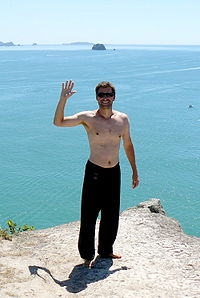News (blog)
4 September 2008[edit] |
| Posted by Nad on 3 September 2008 at 23:39 |
|---|
This post has the following tags: News
|
|
SimpleSecurity4 ready for use and testing[edit]The general problem with implementing a proper security solution in MediaWiki is that although most of the actions one can perform on articles can be restricted easily, the ability to read content cannot be easily restricted on a per-title basis. The reason reading is difficult to restrict is because it's an operation which is not just performed via one action, but rather that many different actions, special-pages and extensions access article content and display it in diverse ways. To make matters worse, many of these diverse means of article access are done by querying the database directly rather than going via the Article class. However all article access made by the main code-base or any other legitimate extension is still done via the Database class to ensure that it is independent of the kind of database server being used. This means that we can implement a tighter security layer by replacing the Database class with a sub-class of it that has the security features added to its access methods. Version 4 of our SimpleSecurity extension is an implementation of this idea, it replaces the existing Database class at runtime with a sub-class called SecureDatabase, and extends the usual MediaWiki page protection mechanism to allow restriction of the read action. See mediawiki.org for installation and usage information, or Extension talk:SimpleSecurity.php for technical details. |
14 January 2009[edit] |
| Posted by Nad on 14 January 2009 at 07:14 |
|---|
This post has the following tags: News
|
|
Automatic article export lists[edit]We have a lot of collections of articles which we tend to re-use a lot on many wikis in the field. We don't want to use cross-wiki transclusion because we don't want these wikis to rely on external content for their day-to-day use, so we needed a simple way to maintain these collections and export them when needed. We've been working on the Packages extension for a while to solve this problem, but in the mean time I created Template:Export which offers a simple interface to the Special:Export functionality. Here's an example, The list of articles to be used by the export doesn't have to be fixed, a DPL query or other kind of dynamic operation can be used to generate it. The query must be made to specify the results be simple textual names separated by newline characters as in the following example which exports all articles containing the {{book}} template.
|
16 May 2007[edit] | |||||||||||||||||||||||||||||||||||||||||||||
| Posted by Nad on 16 May 2007 at 01:29 | |||||||||||||||||||||||||||||||||||||||||||||
|---|---|---|---|---|---|---|---|---|---|---|---|---|---|---|---|---|---|---|---|---|---|---|---|---|---|---|---|---|---|---|---|---|---|---|---|---|---|---|---|---|---|---|---|---|---|
This post has the following tags: News
| |||||||||||||||||||||||||||||||||||||||||||||
|
Fast DOM querying[edit]A number of development threads we've been working on have recently run into trouble with the JavaScript not being able to easily obtain the necessary selections of nodes from the browser DOM. These DOM queries are usually similar in nature to a CSS selector requiring, for example, a selection of all nodes contained within an element of specified tag-name, and having a class or id attribute of a specified value. Often it would be convenient to actually use CSS syntax to specify a selection statement (eg. a.new, a.ext, #portal a:hover), and have a DOM-node-list returned containing all matching elements in the document. Many other people have been having similar problems with the limited selection abilities of the basic DOM methods and have come up with a number of open source solutions.
MediaWiki Sortable Tables[edit]It says in M:Help:Sorting that MediaWiki version 1.9.x now has native support for sortable tables. But actually the method they're using is fully a client-side JavaScript solution developed here by Joost de Valk. So by adding the source code to your MediaWiki:Common.js article (and enabling it by setting $wgUseSiteJs to true in your LocalSettings.php file) any wiki can do it. This will compliment the new display filter and upload CSV extensions perfectly. The following example also demonstrates another useful feature which is the alternate striped background colours making the table much easier to read, these stripes are maintained regardless of the sorting order of the table.
|
19 April 2007[edit] |
| Posted by Nad on 19 April 2007 at 09:26 |
|---|
This post has the following tags: News
|
|
New transform-changes extension for all MediaWiki's[edit]MediaWiki's damn cool, but let's face it the standard recent-changes and watchlist formats are pretty hiddeous! they're difficult to read and generally unpleasent looking, so I've made a quick extension to reformat them from a bullet list into a table. It also adds CSS classes to the table, rows and columns for easy customisation of styles.
|
1 July 2013[edit] |
| Posted by Nad on 1 July 2013 at 17:17 |
|---|
This post has the following tags: News
|
|
Server software upgrade completed[edit]Over the last week we've been upgrading the wiki from MediaWiki 1.19.2 to 1.21.1, the server operating system from Debian 6 to 7 and the web server from Apache to Nginx. One reason for the move is the recent interest in Perfect forward secrecy (PFS) coming from articles such as this. PFS is an obscure feature of SSL/TLS and requires at least OpenSSL version 1 which is included in Debian 7 but not in version 6. Also a more recent version of Apache than is packaged in Debian 7 is required, but Nginx has supported PFS for quite some time now. In addition to supporting PFS, Nginx is by all accounts much more efficient than Apache as it uses an asynchronous event-driven approach to handling requests, instead of the Apache threaded or process-oriented approach. Also Nginx's event-driven approach can provide more predictable performance under high loads, thus their slogan; get async or get sunk! |
19 March 2012[edit] |
| Posted by Nad on 19 March 2012 at 13:11 |
|---|
This post has the following tags: News
|
|
Greece develops cashless Euro-free currency[edit]In Greece a new bottom-up network of cashless exchange called the Magnesia Exchange and Solidarity Network is becoming very popular. It uses a medium of exchange called "tems" which is organised with the Dutch open-source Cyclos decentralised online banking system. Hording and debt are prevented by not allowing accounts to accumulate more than 1200 tems and not allowing people to owe more than 300. The people using it feel very empowered and optimistic about being able to trade together without relying on the financial system. (read more) See also: |
25 January 2012[edit] |
| Posted by Nad on 25 January 2012 at 14:57 |
|---|
This post has the following tags: News
|
|
Byzantium Linux Released![edit]Project Byzantium, a working group of HacDC, is proud to announce the release of v0.1 alpha of Byzantium Linux, a live distribution of Linux designed to fulfill a crucial role in the evolution of the Internet. That role is a rapidly deployable ad-hoc wireless mesh network which can augment or replace the current telecommunications infrastructure in the event that it is knocked offline (for example, due to a natural disaster) or rendered untrustworthy (widespread surveillance or disconnection by hostile entities). Unlike other mesh networking projects Byzantium was designed to be run on any x86 computer with at least one 802.11 a/b/g/n wireless interface. Byzantium can be burned to a CD- or DVD-ROM (the .iso image is just over 300 megabytes in size), booted from an external hard drive, or can even be installed in parallel with an existing operating system without risk to the user's data and software. Byzantium Linux will then act as a node within the mesh and will automatically connect to other mesh nodes and act as an access point for WiFi-enabled mobile devices.Note: Byzantium is an alpha release Don't expect Byzantium to be perfect. Some features are not ready yet, others need work. Things are going to break in weird ways and we need to know what those ways are so we can fix them. Please, for the love of LOLcats, do not deploy Byzantium in situations where lives are at stake. [more] |
1 January 2009[edit] |
| Posted by Nad on 1 January 2009 at 04:04 |
|---|
This post has the following tags: News
|
|
Happy New Year!!![edit]Happy New Year from all of us here at Organic Design :-) Some of the team met in Whitianga for discussions about our plans for 2009. The photo to the right shows Aran giving a Happy New Year wave from the top of the cliffs above Lonely Bay which is next to Cook's beach. Below is a picture of a Welcome Swallow that have their nests in the cliffs. |
17 May 2015[edit] |
| Posted by Nad on 17 May 2015 at 22:11 |
|---|
This post has the following tags: News
|
|
Happy Birthday Organic Design wiki![edit]Organic Design wiki is ten years old today! Rob made the first edit way back in 2005 on this day, when he created the article CD to boot both Mac and PC on our brand new MediaWiki version 1.4! Rob set up the wiki so that we could collaborate on our code and ideas together more easily, and it really made a huge difference to our productivity. Over the years the wiki has been used for organising our many different concepts and projects such as many MediaWiki extensions, the original nodal network concept, our many documented procedures and even pictures, notes and the odd photo story. It's also been very useful for storing general technical articles such as Nginx and SSL and for documenting jobs such as Google Maps API and Extension:jQueryUpload. Since I moved to Brazil the wiki has been my main way to keep friends and family up to date with what Beth and I are up to over here, starting with Moving from Curitiba to Canela all the way up to our recent current posts in 2014 Holiday in Brazil and Our third year on the land which both use the Bliki extension to make the wiki work more like a real blog. Although our main focus is now the land, meditation and related projects such as our rural net connection and our house, I'm still working mainly with MediaWiki for my job and actively developing and maintaining MediaWiki extensions, the most recent being Extension:WebSocket and AjaxComments 2.0. So Happy 10th anniversary Organic Design wiki, thanks for all your organisation! |
24 October 2011[edit] |
| Posted by Nad on 25 October 2011 at 02:56 |
|---|
This post has the following tags: News
|
|
Vatican calls for Central World Bank[edit]Just like clock-work, the Vatican offers to save the world with just what we're all asking for - financial transaction tax and moral foundation to global finance. The document is not binding and is not signed by the pope himself, but may well be a sign of what's to come - the Vatican playing the "good cop" to come and solve all our problems. It's important that we, the people, the 99%, understand clearly that we need to organise from the bottom-up to transcend the global problems we face today. A single authority, no matter how well-dressed its promises may be, is just another oligarchy to replace the current one.
|













